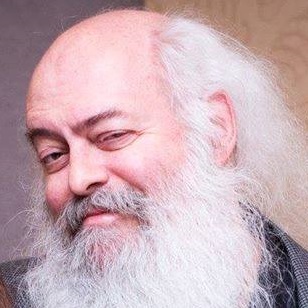PodCastle 829: DOUBLE FEATURE: When the Giants Came Through the Valley and Floaters
Show Notes
Rated PG-13
When the Giants Came Through the Valley
by Derrick Boden
When the giants came through the valley, they made footprints as long as the Santa Monica Promenade, as wide as Dodgers’ Stadium. They crushed dance studios, keto cafes, a waterpark. They left trails of steep-sided ravines with walls of stratified clay and crumbling asphalt, and this is where we now live. Sunset comes earlier down here, but it could be worse.
Our footprint is deep and arid and full of retooled strip malls. We dwell in the remains of Foot Lockers and tiki bars, tag our names out front in bold blue letters. Lazy Stan, Carmencita, Hot Hot Henri. We didn’t all live here, before the giants came through. We’re a product of collective chance. Grinding out another two-hour commute, heading for happy hour at The Village after working another double, the third this week. Some of us still have homes topside, in buildings the giants happened to miss. But that’s neither here nor there. The footprint is our home, now.
No two footprints are the same. Ours doesn’t have much going for it, aside from a surprisingly fertile heel wall. Good for growing grapes, which has come in handy considering how the airdrops never include any wine. A few footprints down, they struck oil. Bleeding through the cracks in that old giant’s sole stamp. Most people topside say the footprints are a blemish, an embarrassment. Not that one. Excavators moved in overnight, kicked everyone out.
The grapes are our little secret.
When the giants came through the valley, they shed all manner of alien creatures. Land-crawling octopuses shaken from the hairs of their feet, huge spiders jettisoned from their vast dreadlocks. Razor-toothed frogs that are ninety-percent mouth.
They scuttled about in a daze, like us, before aggressively laying claim to whatever residence they could find. The dusty asphalt crags of a basketball court, the ethernet-cable jungle of a ruined server farm. Most of them are herbivores, lucky us. Tomas took it upon himself to sort out which ones weren’t. He had a good run; we’re thankful for his contributions.
Topsiders have a rule. Anything that breaches the surface that isn’t human, kill it. Down here, though, it’s live and let live. Sure, the critters aren’t always pleasant, but who can blame them? They’re just like us, clinging to some dispassionate monolith our whole lives because we’re all too scared to let go, even as it stomps and stomps and stomps on everything we’ve ever known. Until finally, through exhaustion or the sheer loss of will, we just can’t hold on anymore.
So we let go.
When the giants came through the valley, they caught everyone unaware. Where did they come from? The Moon? Mars? Bakersfield? Did they rise from an age-old slumber deep within the crust of the earth?
Perhaps we’ll never know.
The governor deployed the national guard, but it was too little, too late. By the time the Harriers howled in with their little-man braggadocio, the giants were gone. They marched straight into the Pacific Ocean without ever looking back, until all we could see — those of us with any view at all — were the forested tops of their heads. Then a ripple of sea foam.
And then nothing.
When the giants came through the valley, they left pieces of us behind.
Benny was a customer service associate at a telecom company, where he’d worked for twelve years and had been passed up for promotion twelve times. He didn’t have that spark, they explained to him. He made two dollars above minimum wage, lived in a loft by the docks where he kept old takeout containers on hand to catch the drips from the ceiling when it rained, which was never frequent enough to warrant the landlord’s attention. He’d never been late for a shift and had never taken a vacation. On his last day of work, the day the giants came through, he’d been called a money-grubbing cockswallow, a capitalist goon, and a script-reading dickwreath. On none of these occasions had he deviated from his list of approved responses. When he looked at himself in the mirror that morning, he still couldn’t find that spark.
When the giants came through the valley, they left two kinds of survivors. Evacuees, and everyone else. They airlifted the first lot within the week. The rest of us, well.
News crews periodically buzz down in their helicopters. They think this thing we’re doing is a movement. Living low, they call it. And us, lowlifes. They seem desperate for us to buy into the notion, to justify what would otherwise be madness.
They always ask the same questions.
“Why are you still down here?”
“You know you don’t have to stay, right?”
We offer assorted reasons. Lower rent, fewer sunburns, no parking tickets. But it’s all bullshit, and the reporters leave wearing the grimaces of beleaguered parents.
So why are we still down here?
Politicians watch the news with an ear for worst-case scenarios; pretty soon movement starts to sound an awful lot like protest. They talk a lot about waiting us out and breaking us up. But what is it they think we’re protesting? And how could this possibly help?
Some developers put together a plan to fill in the footprints with sand from Palmdale, cover them in glass domes, turn them into high-end novelty spas. Maybe someday they’ll have their way. Until then, we accept our monthly airdrop of rations graciously, though we don’t really need it. Shayna’s garden is a thing of wonder, and it turns out the eggs from those razor-toothed frogs are pretty tasty with a little salt.
What we’re doing, I suppose, is living. Just a little farther down.
Jaime was a middle manager at an insurance company where he averaged sixty-hour weeks. His job was to deny claims; a single approved claim would cost him his entire monthly bonus. His boss punched down, so Jaime did the same, because that’s how you get ahead, and getting ahead is the dream. Besides, he was doing his team a solid — keeping them productive, keeping them employed. With the right amount of pressure, Trish might get that raise. Rama might finally make assistant manager. And boy, would they ever thank Jaime when they did.
Jaime had been smoking more every day. It was an expensive habit, sure, but it helped with the stress, and he earned a bonus after all. By the time the giants came through, he was up to three packs a day. He took his smoke breaks in the back alley, where they tossed the shredded remains of incriminating paper trails into big green dumpsters. Until, on that particular morning a few hours before the giants came through, when he stepped outside and promptly tripped over Rama, who happened to be lying facedown in a sticky morass of his own blood. The body looked deflated from the ten-story jump that had pulped his bones.
When the giants came through the valley, they never once looked down. Did they even know we were here? Did they care? Were we that inevitable trail of ants, trampled on the way to the beach? Or was this a deliberate act?
Some survivors prayed it was malicious. Better to be spurned than ignored. Those were the survivors who left.
The ones who stayed, we know better. Giants rarely spare a thought for what’s underfoot.
Anna cobbled shifts at three dishwashing gigs to make rent, kept her garnished tips in a coffee tin under her bed because she couldn’t get a bank account ever since her ex-husband wrote those bad checks to pay off his gambling debts. Three years later, she’d saved enough for a flight to Guatemala to visit her mother in hospice. On her way to the bank for a money order, the day before the giants came through, LAPD pulled her over. When she handed the officer her documents, his cold blue eyes lingered on the cash that plumped her wallet. He noticed a discrepancy with her immigration papers, brought her to precinct. Eight hours later, he let her go. The money in her wallet was gone. Her mother passed the next morning.
The night after the giants came through, we huddled around a barrel fire outside the pitted remains of a once-hip boba cafe, a host of alien creatures scuttling madly beyond the shadows. Tiny flames pitted Anna’s brooding eyes.
She folded her hands neatly in her lap, and said, “I’m done.”
There were nods all around.
When the giants came through the valley, they left us all behind. What a cruel trick. None of us thought to grab hold and hang on. Where would we have ended up, if we had? Surely someplace better, we thought at the time.
Now, months later, as we sit around the barrel fire that has become our town hall, we harbor no such thoughts. We’re not interested in the worlds of giants. We’re lowlifes, and we always keep an eye on where we step.
Floaters
by Kevin Sandefur
Host Commentary
That was “When the Giants Came Through the Valley” by Derrick Boden, and if you enjoyed that, he’s had three stories over on Escape Pod before now: episode 897 Migratory Patterns of the Modern American Skyscraper; episode 766 The Unrepentant; and episode 721: Hustle. There’s a whole bunch more on his website, too,
Derrick had this to say about When the Giants Came Through the Valley: This story was born from a daydream I had about whole ecosystems thriving in the footsteps of giants who’ve passed through. Once I decided to set the story in the modern era, it seemed natural that a story about giants (and what they leave behind) should be a critique on American capitalism. Of course, the story wouldn’t be half what it is without the always-on-point feedback of my Clarion West and Codex friends.
And that was “Floaters” by Kevin Sandefur, and if you enjoyed that, he’s not been at Escape Artists before—but, after some diligent application of Google Fu on your behalf, I have discovered you can search for “Kevin Sandefur, Author” on Facebook to find his author page there, and then there’s a link to a Google Docs spreadsheet with all his other stories linked for you.
Kevin had this to say about his story: “Floaters” was born out of a growing sense on my part that we, as a species, seem to be increasingly capable of normalizing even the most remarkable events and circumstances, no matter how outlandish they might initially appear, on our way towards ultimately forgetting them entirely.
Thank you, Kevin, for the story and the thoughts. These two were, you will probably be unsurprised to hear after two years of my nonsense, entirely my jam. The little folk getting forgotten by people who think us beneath them? Who don’t think twice to look where they’re stepping as they charge through our lives? Who consider us only when we pique their curiosity? Goodness me if that ain’t a chief theme of my thinking these past 15 years since I graduated into a global market crash and witnessed my government commit to an economic principle that seems predicated, largely, on how it can make their rich mates richer at the expense of the rest of us.
I am obsessed with all the absurd ways you can put a billionaire’s wealth into perspective—earning a dollar a second gets you a thousand in 16 minutes, a million in 12 days, but it takes 31 years to get to a billion; the average US salary is about $54k a year, and if you’d earned that since Homo Sapiens first walked the earth you’d still only be 10% as rich as Jeff Bezos; you’d have had to earn it every day, since the Mesopotamians first planted wheat to match his net worth.
I tried to write this next thought more politely, so I’m sorry for my failure, but there is, truly, only one way to express it: who the fuck needs that much? Needs it so much his drivers have to urinate in bottles rather than risk stopping and delaying the Bezos Profit Conveyor Belt for even 2 minutes? Craves it so desperately that his workers are harangued by management within 2 minutes for a mistake, but can then go 20 minutes before anyone notices they’ve had a heart attack?
And those are just the people directly employed—there are whole companies that Amazon have run out of business by simply bringing their capital to bear to undercut them out of existence, because Gods forbid precious Mr Bezos should ever have to share anything. And I am picking on him as a target here—though I’m sure he’ll be fine, and not even notice me under foot!—but there’s a whole class just like him, who consider the rest of us as naught more than statistics.
The most telling phrase in all of corporate culture is human resources. We! Are! Not! A! Resource! We are lives, stories, emotions and movements and hopes and dreams and mistakes and good gods if the big guys won’t acknowledge our existence—and I use a gendered term deliberately and accurately, let’s be honest—it is up to us to see each other. To not get angry at the person in the call centre who is exhausted from their second job last night because this one doesn’t pay enough, to be a little more patient when someone snaps at us because they’re overwhelmed, to treat each other with the kindness and respect that the system has discarded as non-quantifiable and unprofitable, because once we lose that, what’s the point?
And maybe we should try to stop ourselves normalising the Absurdly Rich as an acceptable and expected part of our society when every single one of us ought to recoil in horror at the greed and selfishness that takes.
About the Authors
Kevin Sandefur

Kevin Sandefur is the Capital Projects Accountant for the Champaign Unit 4 School District and is currently pursuing a Bachelor of Applied Studies in Creative Writing at the University of Iowa. His fiction has appeared or is forthcoming in The Saturday Evening Post, Pulp Literature, and MetaStellar. He lives with his wife and two cats in Champaign County, Illinois, which is a magical place where miracles happen almost every day, and hardly anyone seems to find that remarkable.
Derrick Boden

Derrick Boden’s fiction has appeared in Lightspeed, Clarkesworld, Analog, and elsewhere. Derrick is a Sturgeon Award-nominated writer, a software developer, an adventurer, and a graduate of the Clarion West class of 2019. He currently calls Boston his home, although he’s lived in fourteen cities spanning four continents. He is owned by two cats and one iron-willed daughter. Find him at http://derrickboden.com and on Twitter as @derrickboden.
About the Narrators
J.S. Arquin

When J.S. Arquin was three years old, he’d carry a stack of books to the nearest adult and demand they read them all to him. When they finished, he’d fetch another stack. Thus began a lifelong obsession with books and the written word.
These days, J.S. is a full time narrator, with over 150 audiobooks recorded. I guess you could say he’s paying all those green eggs and ham forward.
You can find him on Instagram and Facebook as Arquinaudiobooks, and on his website http://www.arquinaudiobooks.com .
Dani Daly




